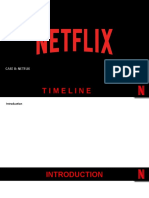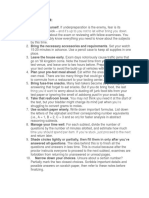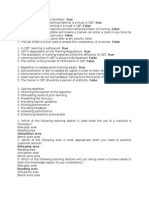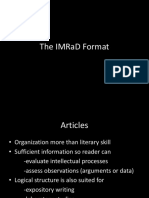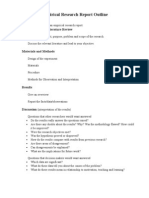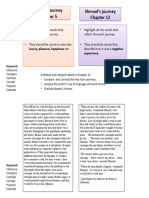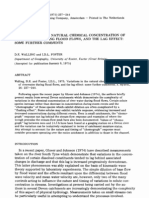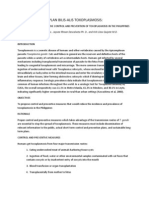How To Write A Research Report
How To Write A Research Report
Uploaded by
ËÐwïn TorresCopyright:
Available Formats
How To Write A Research Report
How To Write A Research Report
Uploaded by
ËÐwïn TorresOriginal Title
Copyright
Available Formats
Share this document
Did you find this document useful?
Is this content inappropriate?
Copyright:
Available Formats
How To Write A Research Report
How To Write A Research Report
Uploaded by
ËÐwïn TorresCopyright:
Available Formats
How to Write a Research Report A.
Darwish
Writing a Research Report Getting started and planning Sections of a typical report Presentation of text, maps, and illustrations Referencing
Writing a Research Report: Getting Started Your Report Should Report on the research project Use research findings to develop some conclusions Develop an argument about your findings Questions your report should address What was the research problem? Why is this problem important? How does the project fit into the context of other research? How did you investigate the research problem? What are your findings? What do these findings tell you? What do you conclude? Writing is an iterative process. Therefore you do not have to start at the beginning! Whatever you do. Just start writing! Additional Tips The value of reflective free writing Discovering new insights while writing Dont seek perfection Be prepared to junk whole sections Steps in writing Free writing Develop an overall argument (Try writing a thesis statement or abstract.) Develop an outline Write Revise, Revise, Revise, Revise Go back and rewrite introduction if necessary
Developing an argument Link theory with research to justify your conclusions Argument should link sections of your report into a coherent story. General Format Front matter Title Page Acknowledgements page Abstract Table of Contents List of Tables List of Figures Body of the report Introduction Literature review Methodology Results Discussion Conclusions End matter Appendices Endnotes Reference list Save time and develop your reference list as you write! Sections of the Report Title Keep it short Use a subtitle if necessary Interesting or amusing titles are better Abstract A 200-300 word non-technical summary of your research project. Questions to answer: What is the research problem and why is it important? What did you do and why? What did you find? What do your findings mean? Introduction Address the topic in the first sentence Introduce the topic by means of an example to illustrate theoretical points Outline your general argument and your paper Literature Review
A discussion of findings from other researchers Critical appraisal of others theories You should compare and assess others results. Provides external context for your project Justifies your project Methodology Details method and procedures Discusses the reasons for choosing your methods and procedures Contents of a methodology section Rationale for methodological approach Hypotheses Description of study area Demographic details of study population How the population was selected Description of types of data and sources Description of methods and procedures for obtaining data Description of methods and procedures of data analysis Results Details the main findings Provides a summary explanation of results Accept or reject hypotheses if you have any Discussion Develop a logical argument about what your results mean. Your results provide evidence to illustrate and support your argument. Identify potential errors--What might invalidate your results? How might you improve research design? Conclusion A restatement of the research problem A summary statement of main findings and their significance. Shortcomings of the research Agenda for future research
You might also like
- Incident at Devils Den A True StoryDocument214 pagesIncident at Devils Den A True Storychbkin100% (2)
- Module 3 - Writing For Different ContextsDocument15 pagesModule 3 - Writing For Different ContextsAriel TiborNo ratings yet
- STEM Teaching Annotated BibliographyDocument4 pagesSTEM Teaching Annotated BibliographyB.y. NgNo ratings yet
- Direct Instruction: Present, Apply, Review (PAR) : Presenter: Regie A. RamisoDocument20 pagesDirect Instruction: Present, Apply, Review (PAR) : Presenter: Regie A. RamisoRegie RamisoNo ratings yet
- Decision MakingDocument41 pagesDecision Makingkcirtap7489No ratings yet
- CH 3 Measurement and DataDocument42 pagesCH 3 Measurement and DatadashanNo ratings yet
- DhaDocument17 pagesDhachakkykichu100% (4)
- Acc 208-05 - Managerial Accounting Spring 2012 Syllabus - FoleyDocument13 pagesAcc 208-05 - Managerial Accounting Spring 2012 Syllabus - FoleyRamiro C Hinojoza FonsecaNo ratings yet
- Constructivism Learning TheoryDocument14 pagesConstructivism Learning TheoryZ. A. AbdulJaleelNo ratings yet
- Quantitative and QualitativeDocument7 pagesQuantitative and QualitativeCindyhhhoNo ratings yet
- Concept Paper For Academic ResearchDocument14 pagesConcept Paper For Academic ResearchArnett Moriah Nicdao100% (1)
- 4 TQ GenEd 2008Document21 pages4 TQ GenEd 2008Russiel DagohoyNo ratings yet
- How To Pass The Civil Service Examination in The PhilippinesDocument5 pagesHow To Pass The Civil Service Examination in The PhilippinesANne S. AñoraNo ratings yet
- How My Kids Passed The UPCAT - The Sure Way!Document2 pagesHow My Kids Passed The UPCAT - The Sure Way!Leopold Laset100% (2)
- Basic Parts and Principles of Thesis and Dissertation WritingDocument5 pagesBasic Parts and Principles of Thesis and Dissertation WritingJessica Joyce PenalosaNo ratings yet
- BOOKKEEPINGDocument17 pagesBOOKKEEPINGDonalyn BannagaoNo ratings yet
- Module 1 Writing Research Proposal FacilitatorDocument122 pagesModule 1 Writing Research Proposal FacilitatorJULHAN GUBAT100% (1)
- Cse Reviewer - MathDocument58 pagesCse Reviewer - MathLyne LerinNo ratings yet
- Verbal ReasoningDocument35 pagesVerbal Reasoningsuraj113No ratings yet
- Software Engineering SyllabusDocument1 pageSoftware Engineering SyllabussunithaseaNo ratings yet
- TTL 1 Midterm LMDocument18 pagesTTL 1 Midterm LMDexter QuilapioNo ratings yet
- 1lesson 1 Basic Concepts of Statistics With AnswersDocument9 pages1lesson 1 Basic Concepts of Statistics With AnswersQUEENIE BUTALIDNo ratings yet
- Module 2: Research Writing: Philippine College of Science & TechnologyDocument13 pagesModule 2: Research Writing: Philippine College of Science & TechnologyCharo GironellaNo ratings yet
- The Use of Multisensory Aids in College TeachingDocument6 pagesThe Use of Multisensory Aids in College TeachingJoyAMC100% (2)
- Defining Research ProblemDocument13 pagesDefining Research ProblemValeed ChNo ratings yet
- Aptitude Tests Abstract Reasoning TestsDocument3 pagesAptitude Tests Abstract Reasoning TestsJuan Luis LusongNo ratings yet
- Writing The Third Chapter "Research Methodology": By: Dr. Seyed Ali FallahchayDocument28 pagesWriting The Third Chapter "Research Methodology": By: Dr. Seyed Ali FallahchayShaneil MatulaNo ratings yet
- CSC Series of TestsDocument45 pagesCSC Series of TestsGlazed Daisy NiloNo ratings yet
- Quiz BowlDocument36 pagesQuiz BowlSherry GonzagaNo ratings yet
- Modmit1 Syllabus t11415 ElgaDocument7 pagesModmit1 Syllabus t11415 ElgaKimyMalayaNo ratings yet
- NMAT-Mathematics EdDocument44 pagesNMAT-Mathematics EdangelaNo ratings yet
- Finalnafinalthesis 100513074602 Phpapp02Document50 pagesFinalnafinalthesis 100513074602 Phpapp02Jimwell ManaloNo ratings yet
- Case Template NetflixDocument11 pagesCase Template NetflixElenvbNo ratings yet
- How To Calculate Sample SizeDocument5 pagesHow To Calculate Sample SizeriwryiNo ratings yet
- Ma. Jheneva C. Magpantay BSE-IV EnglishDocument16 pagesMa. Jheneva C. Magpantay BSE-IV EnglishMa. Jheneva MagpantayNo ratings yet
- Management Approaches, Techniques, and Management ProcessesDocument13 pagesManagement Approaches, Techniques, and Management Processesapi-3709659No ratings yet
- TIPS For TLE MajorsDocument7 pagesTIPS For TLE MajorsJethro Apolinar BaladingNo ratings yet
- Child and Adolescent Development Part 1Document4 pagesChild and Adolescent Development Part 1Analyn L. Rosales100% (1)
- During Exam: Believe in YourselfDocument3 pagesDuring Exam: Believe in Yourselferika marizNo ratings yet
- ENRIQUEZ - Mechanics in WritingDocument40 pagesENRIQUEZ - Mechanics in WritingKyla EnriquezNo ratings yet
- Lesson Iv PDFDocument4 pagesLesson Iv PDFWendy Mae LapuzNo ratings yet
- RM6. Data InterpretationDocument14 pagesRM6. Data Interpretationshahin2117No ratings yet
- CSC 122 Data Structure SyllabiDocument7 pagesCSC 122 Data Structure SyllabiQueniel QuezmarNo ratings yet
- Civil Service Exam ReviewersDocument23 pagesCivil Service Exam ReviewersJudel Kidatan Valdez100% (4)
- Socio-Cultural EnvironmentDocument18 pagesSocio-Cultural EnvironmentMotiram paudel100% (1)
- Environmental Science Introduction To Environmental Science PPTXDocument46 pagesEnvironmental Science Introduction To Environmental Science PPTXjohn davidlee dizonNo ratings yet
- Impact of Greenwashing Perception On Consumers GRDocument16 pagesImpact of Greenwashing Perception On Consumers GRakasuatuoitranchauduongdenNo ratings yet
- Thesis Writing LectureDocument96 pagesThesis Writing LectureGuillermo O. Bernabe100% (2)
- Internal Auditing SolManDocument6 pagesInternal Auditing SolManJoyce Anne Gevero CarreraNo ratings yet
- Aptitude Tests For EmploymentDocument40 pagesAptitude Tests For EmploymentDarkart1No ratings yet
- Vocabulary QuestionsDocument6 pagesVocabulary QuestionsAna Maria D. AlmendralaNo ratings yet
- Chap 002 Frequency TablesDocument24 pagesChap 002 Frequency TablesArief NugrohoNo ratings yet
- Foundation Studies First Semster Workbook 2021 To 2022Document45 pagesFoundation Studies First Semster Workbook 2021 To 2022barbarconteh5No ratings yet
- Kuder Career Interests Assessment Kuder Skills Confidence AssessmentDocument4 pagesKuder Career Interests Assessment Kuder Skills Confidence Assessmentapi-302122869No ratings yet
- Facilitate ExamDocument8 pagesFacilitate ExamApol MaañoNo ratings yet
- Institute of Teacher Education Chess Piece and Numeral DiceDocument54 pagesInstitute of Teacher Education Chess Piece and Numeral DiceArtlie Antonio GarciaNo ratings yet
- 4 2 The IMRaD FormatDocument32 pages4 2 The IMRaD FormatAshley BautistaNo ratings yet
- Research Methodogy Class 7Document16 pagesResearch Methodogy Class 7MoriwamNo ratings yet
- Scientific CommunicationDocument47 pagesScientific Communicationhusiensalih100No ratings yet
- Outlines and Guidelines For PaperDocument4 pagesOutlines and Guidelines For Paperlemodada8497No ratings yet
- IMRadDocument26 pagesIMRadALLEN LAURETANo ratings yet
- Computer Science Principles-SyllabusDocument4 pagesComputer Science Principles-SyllabusTiffanyNo ratings yet
- OO3 - CESC - 2nd ExamsDocument15 pagesOO3 - CESC - 2nd ExamsJacquesse Mackenzie LicoNo ratings yet
- Prepare Today's BPC Stand-Alone Planning Projects For A Future Migration To SAP Simple Finance in S/4 HANADocument14 pagesPrepare Today's BPC Stand-Alone Planning Projects For A Future Migration To SAP Simple Finance in S/4 HANAgiofwNo ratings yet
- Assignment On SC and VADocument12 pagesAssignment On SC and VAVixen Aaron EnriquezNo ratings yet
- A Study of The Impact of Social Media On Consumers: M. Nick HajliDocument28 pagesA Study of The Impact of Social Media On Consumers: M. Nick HajliAizaz AliNo ratings yet
- Otorhinolaryngology Mnemonics by Medica Study CenterDocument27 pagesOtorhinolaryngology Mnemonics by Medica Study CenterPrekshi 1808No ratings yet
- Rahu in Vedic AstrologyDocument2 pagesRahu in Vedic Astrologytmn2011No ratings yet
- Handling and Taking Over ReportDocument14 pagesHandling and Taking Over ReportRoopa KatariaNo ratings yet
- Sonnet 29 Detailed Lesson PlanDocument7 pagesSonnet 29 Detailed Lesson PlanAte Anjie67% (3)
- JourneysDocument2 pagesJourneysyousef tamerNo ratings yet
- Chap 9Document12 pagesChap 9Paulina GalindoNo ratings yet
- Karush - National Identity in The Sports PagesDocument23 pagesKarush - National Identity in The Sports PagesNdRF16No ratings yet
- KCS301 (DST) Blow UpDocument12 pagesKCS301 (DST) Blow UpShikha AryaNo ratings yet
- IAS 35 Discontinuing Operations: International Accounting StandardsDocument19 pagesIAS 35 Discontinuing Operations: International Accounting Standardsrio1603No ratings yet
- Player Oriented Roleplaying: Timing, Action, & Lucidity: Jared PreslerDocument84 pagesPlayer Oriented Roleplaying: Timing, Action, & Lucidity: Jared Presleroskar123409No ratings yet
- Nurture Your RelationshipDocument2 pagesNurture Your RelationshipMary Biscocho100% (1)
- Syntax PPT LectureDocument10 pagesSyntax PPT LectureMaxpein AbiNo ratings yet
- Pile Integrity Test2 PDFDocument3 pagesPile Integrity Test2 PDFSima Datta Deb100% (1)
- Bayzat Team - BiosDocument1 pageBayzat Team - Biosapi-257453615No ratings yet
- Speaking TestDocument3 pagesSpeaking Testnohuynh.31231026609No ratings yet
- Variations in The Natural Chemical Concentration of River Water During Flood Flows, and The Lag EffectDocument8 pagesVariations in The Natural Chemical Concentration of River Water During Flood Flows, and The Lag EffectjcmqqujwNo ratings yet
- Reaction PaperDocument17 pagesReaction PaperRevtech RevalbosNo ratings yet
- Oplan Alis ToxoplasmosisDocument3 pagesOplan Alis ToxoplasmosisRhoanjayvee Dela Rosa DescalsotaNo ratings yet
- Nursing Process With Virginia HandersonDocument2 pagesNursing Process With Virginia HandersonAnonymous 5QMVtPPG7No ratings yet
- Kathleen Raine - The Voice of The Sacred in Our TimeDocument6 pagesKathleen Raine - The Voice of The Sacred in Our TimeKenneth AndersonNo ratings yet
- Verbal AnalogyDocument23 pagesVerbal AnalogyvighneshmanojNo ratings yet
- Staffing: Management of Human Resources at INFOSYSDocument32 pagesStaffing: Management of Human Resources at INFOSYSADITHYANo ratings yet
- My Case StudyDocument2 pagesMy Case StudyEnduranceNo ratings yet

































